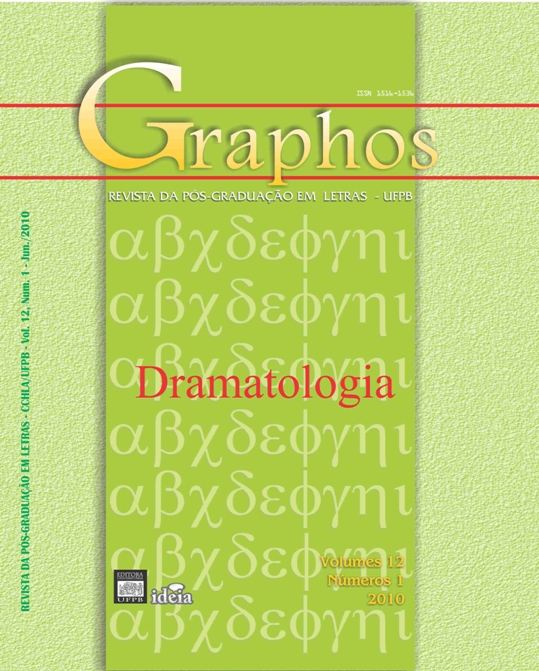Autor implícito e narratividade no drama de Ésquilo
Keywords:
Implied author, Narration, Narrator, AeschylusAbstract
The concept of implied author is used by Wayne Booth in his study of literary fiction, being it an epopee, a novel or a short-story, starting from a discussion on the nature of narrative as part of rhetoric. In our understanding, the figure of the implied author, an intermediary and fictional entity placed on the boundaries between the real writer and the narrator, could be analyzed considering its role in traditional drama. In traditional drama, the implied author confers the power to narrate to narrators who are part of the dramatization process, such as the messenger, and in some cases, the chorus, and through them, articulates the structural organization of the plot. According to Booth, the process of narration involves, as in any literary discourse, the absence of objectivity and of impartiality. Considering these aspects in relation to the study of the tragedy The Persians, by Aeschylus, we identified, in the rhetoric and also in the epic resources that dominate this drama, a strategy of the implied author to formulate a view that, regardless a pamphletarian nationalism, praises the greatness and the victory of the Greeks in the Salamina Battle and the tragic error of the emperor Xerxes, commander-in-chief of the defeated Persian army.
Downloads
References
AGUIAR E SILVA, Vitor Manuel de. Teoria da literatura. 4 ed. Coimbra: Almedina, 1982.
ARISTÓTELES. Poética. Trad. Eudoro de Sousa. São Paulo: Ars Poetica, 1993.
BOOTH, Wayne. A retórica da ficção. Trad. Maria Teresa H. Guerreiro. Lisboa: Arcádia, 1980.
CUNHA, Antônio Geraldo da. Dicionário Etimológico Nova Fronteira da Língua Portuguesa. 2 ed. Rio de Janeiro, 1982. ÉSQUILO. “Os Persas.” In.___ A tragédia grega. Trad. Mário da Gama Kury. 4 ed. Vol. 4. Rio de Janeiro: Jorge Zahar Editor, 2000.
____. Os persas. Trad. Maria José de Carvalho. Disponível em: http://www.lendo.org/a-tragediagrega/. Acesso em 16 de julho de 2010.
GENETTE, Gérard. Discurso da narrativa. 3 ed. Trad. Fernando Cabral Martins. Lisboa: Veja, 1995.
HARVEY, Paul. Dicionário Oxford de Literatura Clássica grega e latina. Trad. Mário da Gama Kury. Rio de Janeiro: Jorge Zahar Editor, 1998.
LESKY, Albin. A tragédia grega. Trad. J. Guinsburg et al. 3 ed. São Paulo: Perspectiva, 1996.
MOSSÉ, Claude. Dicionário da Civilização Grega. Trad. Carlos Ramalhete. Rio de Janeiro: Zahar Editor, 2004.
PAVIS, Patrice. Dicionário de Teatro. 2 ed. Trad. J. Guinsburg e Maria Lúcia Pereira. São Paulo: Perspectiva, 2003.
REIS, Carlos; LOPES, Ana Cristina M. Dicionário de teoria da narrativa. São Paulo: Ática, 1988.
ROSENFELD, Anatol. O teatro épico. 4 ed. São Paulo: Perspectiva, 2002.
SCHÜLER, Donald. “Os sete contra Tebas e a tragédia guerreira de Ésquilo.” In: ÉSQUILO. Os sete contra Tebas. Trad. Donald Schüler. Porto Alegre: L&PM, 2007.
STAIGER, Emil. Conceitos fundamentais da poética. Trad. Celeste Aída Galeão. Rio e Janeiro: Tempo Brasileiro, 1975.







